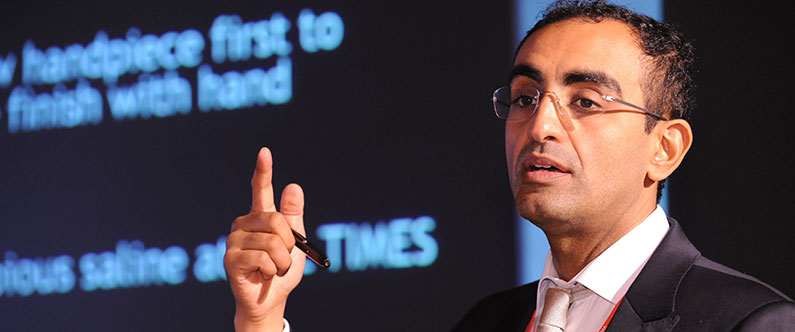Dentists can help catch undiagnosed diabetes, WCM-Q seminar hears
 Periodontal specialist Dr. Hatem Algraffee visited from the UK to lead a practical workshop event at Weill Cornell Medicine-Qatar.
Periodontal specialist Dr. Hatem Algraffee visited from the UK to lead a practical workshop event at Weill Cornell Medicine-Qatar.
Dentists are ideally placed to spot undiagnosed cases of diabetes because of an often overlooked link between diabetes and gum disease, a two-day practical workshop held at Weill Cornell Medicine-Qatar (WCM-Q) heard.
Visiting expert Dr. Hatem Algraffee, a specialist periodontist and lecturer based in London, explained that diabetes patients have an increased risk of suffering gum disease.
Speaking at the Periodontal Disease: From Screening to Management workshop at WCM-Q, Dr. Algraffee said:
“The prevalence of diabetes across the Gulf region is high and growing, and it is estimated that up to 40 percent of cases remain undiagnosed.
Because gum disease is more common among diabetes patients, dentists have a key role to play in helping to identify those who might have undiagnosed diabetes. Dentists should refer patients with gum disease to physicians to be tested for diabetes, and physicians should refer diabetes patients to a dentist to help treat or prevent gum disease. Working in tandem like this will allow us to provide better overall care and identify some cases of diabetes that have been missed.”
Coordinated by WCM-Q’s Division of Continuing Professional Development, the workshop offered dentists, dental nurses, dental assistants and oral hygienists practical instruction on a wide range of issues related to periodontal disease.
 These included how to screen and assess patients with periodontal disease, how to identify a tooth affected by periodontal disease, and strategies for coordinating successful treatment plans. There were also discussions about the prevalence of diabetes and its association with periodontal disease and a demonstration of techniques that can be used to address periodontal disease. This included a demonstration of crown lengthening, a key surgical procedure in which gum tissue surrounding a tooth is carefully incised to expose more of the tooth and allow for it to be repaired.
These included how to screen and assess patients with periodontal disease, how to identify a tooth affected by periodontal disease, and strategies for coordinating successful treatment plans. There were also discussions about the prevalence of diabetes and its association with periodontal disease and a demonstration of techniques that can be used to address periodontal disease. This included a demonstration of crown lengthening, a key surgical procedure in which gum tissue surrounding a tooth is carefully incised to expose more of the tooth and allow for it to be repaired.
Periodontal disease is extremely widespread and is estimated to be one of the ten most prevalent diseases globally. Dr. Algraffee explained that more than 80 percent of people worldwide are affected by some form of periodontal (gum) disease including gingivitis, with around 15 percent of the population suffering from advanced gum disease.
He said: “Periodontal disease is very common and can cause people great discomfort through loss of teeth, trouble eating, loss of self-confidence, speech problems and general loss of quality of life. These factors can be very upsetting and painful for people so it is crucial that we take dental health seriously.”
Dr. Algraffee said that the most important factor to protect one’s dental health is to find a dentist and have regular checks ups, in addition to brushing well two times each day. He also said that seeing a dental hygienist is important, and that Qatar has recently invested in training hygienists.
The activity was an Accredited Group Learning Activity (Category 1) as defined by the Qatar Council for Healthcare Practitioners – Accreditation Department and was approved for a maximum of 11 hours.
Ms. Deema Al-Sheikhly, Director of Continuing Professional Development at WCM-Q, said:
“We are delighted to welcome such a well-qualified specialist periodontist as Dr. Algraffee to WCM-Q to offer dental health professionals in Qatar the most up-to-date practical guidance on periodontal screening and treatment. It is extremely important to take periodontal disease seriously, not only to protect oral health, but also to help identify undiagnosed diabetes.”